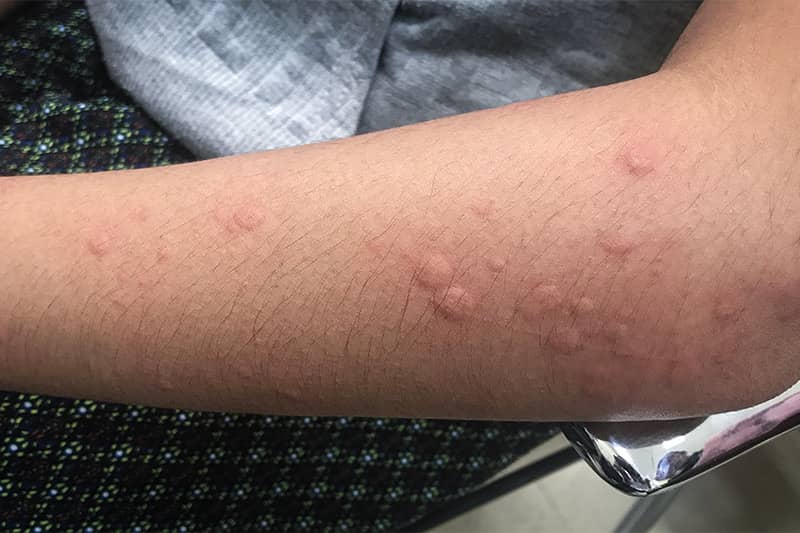Whether your allergies are seasonal or chronic, working with an immunologist can help you get on top of your symptoms and reduce your allergic reactions. For many patients, the dismissive idea that their condition is “just allergies” is actually short-sighted. Over time, allergies can lead to dangerous complications. Located in the Medical Arts Pavilion near Princeton Hospital, the allergy & immunology professionals at Penn Medicine Becker ENT and Allergy in Plainsboro, NJ, can help you better understand and manage your allergies.
What Are Allergies?
An allergy is the body’s reaction to a generally safe substance, such as:
- Pet dander
- Foods, such as milk or shellfish
- Pollen
- Dust mites
- Medications
- Bee or wasp venom
It’s your immune system that triggers an uncommon reaction to everyday substances in an attempt to keep you safe from these “intruders.” While this reaction can be quite helpful if you are exposed to a virus because it builds antibodies and usually means you cannot catch that virus again, allergy sufferers may find that their reaction to benign environmental or ingested allergens ranges from uncomfortable to dangerous.

If each exposure means that your next reaction will come on stronger and be more severe, you may go from sneezing from pollen exposure to an asthmatic wheeze or progress from swelling at a sting site to an anaphylactic reaction and a complete airway shutdown. Even if this progression doesn’t occur, you can still suffer from uncomfortable symptoms like itchy or watery eyes, a runny nose, skin rashes, and more.
What to Expect at Your Immunology Appointment
Your allergy doctor has several tools available to help you reduce your allergy symptoms and even your reactions. The first step is testing, however. These tests are designed to assist you and your physician in determining the trigger for your allergic responses.
These tests can include:
- A blood draw for testing
- A skin test, where the allergen is applied topically to gauge your reaction
- A scratch test, where the skin surface is broken, and the allergen applied
- A lung function test
- A nasal swab
Because these allergy tests are designed to determine your specific triggers, you may suffer a small allergic reaction. However, once you and your physician know what it is that is causing your discomfort, you can take steps to avoid the allergen, lessen your exposure, medicate at the right times to get in front of the seasonal pollen onslaught, or even begin immunotherapy treatments.

How an Allergist Can Help
One of the benefits of working with an allergy specialist is that you can gain a sense of control over your symptoms. When you know what type of pollen it is that fires up your immune system, you can avoid it or take medication to stop the sneezing before you develop rhinitis.
Your Plainsboro immunology professionals can do more than help you avoid your yearly sneezy season, though. Allergy shots can help you build up resistance to allergens over time. Other allergy treatments may also be available. Allergies can lead to serious immune system challenges, cause permanent lung damage, and leave you with chronically red, puffy eyes.
How to Get Ready for Your Allergy Doctor Consultation at Our Plainsboro Office
Come prepared for your appointment with our specialists so you can make the most of your visit. Bring a list of all your current medications. Consider also bringing a blank journal so you can discuss the benefits of tracking your allergic reactions with regard to:
- Date
- Time
- Severity
- Location
- What you ate
Make sure you wear loose clothing so you can easily have blood drawn. If you are going to have a patch test or a scratch test, consider wearing something lightweight and oversized to avoid skin contact after your test.
Why Choose Penn Medicine Becker ENT?
The professionals at Penn Medicine Becker ENT offer care that includes
- ENTs
- Allergy specialists
- Head and neck surgeons
- Audiologists
Over time, your allergy symptoms can lead to serious health complications. For example, itchy, red eyes can damage your self-confidence and cause chronic puffiness. Sinus inflammation can cause snoring and sleep apnea. Swelling in your throat can cause ear infections, balance issues, and tinnitus. You may lose your voice at the end of the day or have trouble swallowing.
The team at Penn Medicine Becker ENT in the Plainsboro, NJ office is highly skilled and will help you figure out your allergy triggers. As you gain control over these reactions, you may find that other chronic health issues, such as itchy eyes, fade. You may even start to sleep better and be able to hear more clearly.
Your immune system may also react more violently with each exposure. This can make your symptoms worse each season or exposure. Making an appointment with an allergy doctor before you develop asthmatic wheezing or chronic sinusitis will not only improve your health during allergy seasons, but it can also both extend your life and make each day easier to face with confidence.
Allergist FAQs
An allergic response occurs when your immune system treats a foreign substance as a danger that must be destroyed. While your immune system is acting on the pollen, dander, or dust, it can cause inflammation that can lead to itching, sneezing, and coughing. Each reaction or seasonal exposure can trigger a more severe response. Your Plainsboro immunologist needs to determine the trigger so you can address the reaction directly instead of suppressing the whole immune system.
Until you undergo immunology testing, you will not know. It is important to note that there are many foods that cause a digestive reaction, such as nausea. However, there are also a lot of foods that either trigger a respiratory reaction or increase the severity of your response, such as milk allergies that result in wheezing and respiratory inflammation. Again, you may complete your allergy journal and find that you do not have any food triggers at all. However, keeping an allergy journal is a wonderful way to manage your condition because it builds awareness and provides you with crucial information.
The community of Plainsboro, NJ, is loaded with outdoor activities and ways to enjoy the natural world. If you are tired of being stuck indoors, an immunology appointment and allergy testing can certainly make your allergies more manageable! Remember that knowledge is key. When your allergies are in a bad flare-up, you may feel that you are allergic to everything outside your front door. Schedule an appointment and get tested so you know what your triggers are. Once you have that information, you can get to work on reducing your exposure to those triggers and enjoying the outdoors again. Dig out your binoculars so you can head out to the Plainsboro Preserve and check out the birds!
Directions to Becker ENT in Plainsboro, NJ
We are located at the intersection of Highway 1 and Scudders Mill Road. Our address is 7 Schalks Crossing Rd #324, Plainsboro, NJ 08536.
From East Brunswick, NJ:
- Take NJ-18 North from East Brunswick, NJ
- Merge onto NJ-18 North
- Take the US-1 South exit towards Trenton
- Continue on US-1 South
- Take the Scudders Mill Rd exit
- Continue onto Scudders Mill Rd
- Turn right onto Campus Rd
- Turn right onto Hospital Dr
- The office is located in the Medical Arts Pavilion at 7 Schalks Crossing Rd #324, Plainsboro Township, NJ 08536
From Princeton, NJ:
- Take US-1 South from Princeton, NJ
- Take the Scudders Mill Rd exit
- Continue onto Scudders Mill Rd
- Turn right onto Campus Rd
- Turn right onto Hospital Dr
- The office is located in the Medical Arts Pavilion at 7 Schalks Crossing Rd #324, Plainsboro Township, NJ 08536

